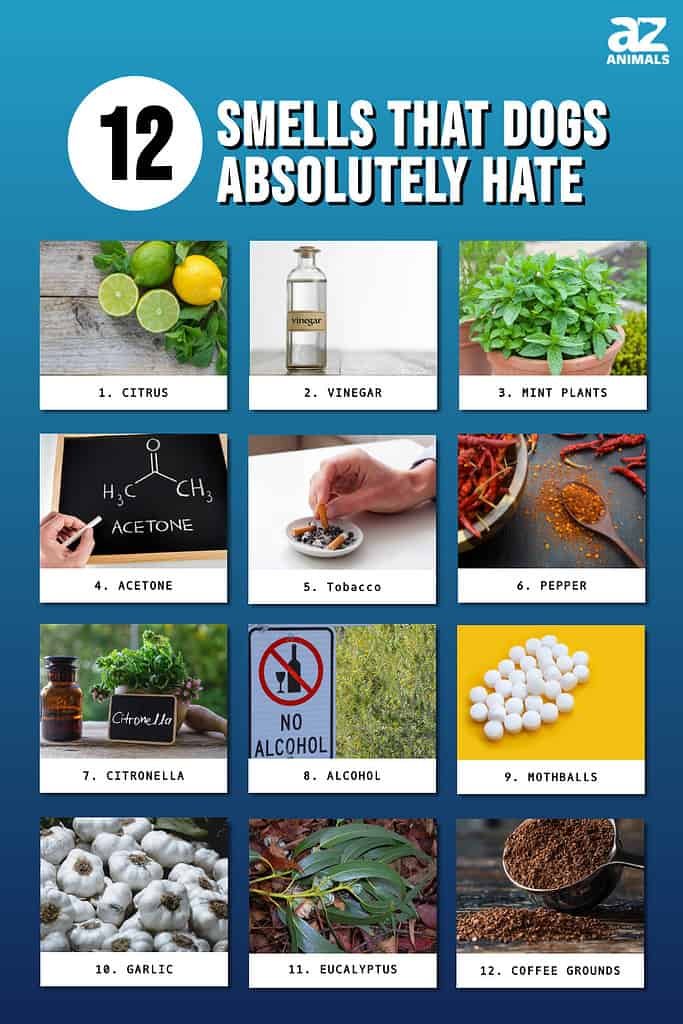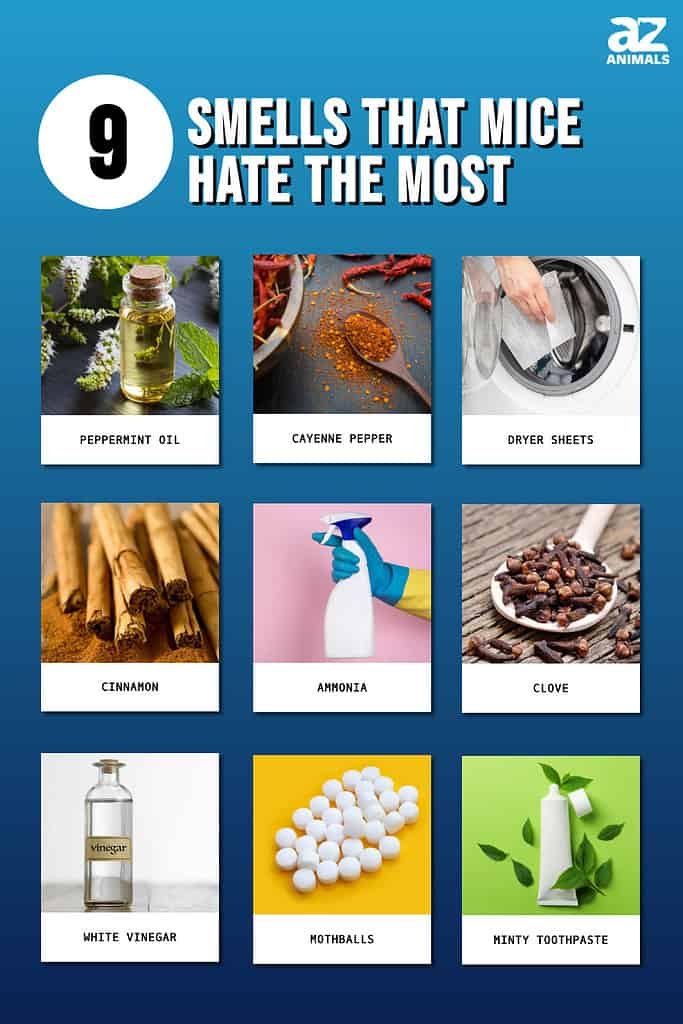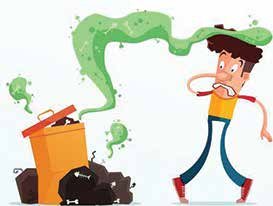Have you ever wondered what smell repels animals the most? From household pests like mice and insects to larger creatures like raccoons and deer, there are certain scents that animals simply cannot stand. Whether it is the pungent odor of peppermint, the strong aroma of vinegar, or the overpowering scent of ammonia, these repellents can be a game-changer when it comes to keeping unwanted visitors away. In this article, we will explore the smells that animals hate the most, and how you can use them to your advantage to protect your home and garden.


Smells That Repel Animals
Types of Smells
Animals have a keen sense of smell, and certain odors can be repugnant to them. These smells can range from natural scents to synthetic substances. Some common categories of smells that animals find repulsive include citrus, peppermint, vinegar, garlic, onions, ammonia, camphor, mothballs, eucalyptus, and predator urine. Each of these smells can have a different effect on different animals, causing them to avoid certain areas or display signs of discomfort.
Why Animals Hate Certain Smells
Animals have evolved to associate certain smells with danger or threat. For example, the smell of predator urine can signal the presence of a potential predator nearby, causing animals to feel fear and avoid the area. Similarly, strong scents like garlic or onions can overwhelm an animal’s sensitive sense of smell, leading to discomfort or repulsion. Additionally, animals have different preferences and sensitivities to different smells, so what may repel one animal might not have the same effect on another.
Factors that Influence Animal Sensitivity to Smells
Several factors can influence how sensitive animals are to smells. One crucial factor is the species of the animal. Different animals have different scent receptors, leading to variations in their olfactory abilities. The size of an animal’s olfactory bulb, the part of the brain responsible for processing smells, can also play a role in their sensitivity. Additionally, an animal’s previous experiences with certain smells can impact their sensitivity to them. If an animal has had negative encounters associated with a particular smell, they are more likely to find it repulsive.
Natural Repellents for Animals
Many natural substances can repel animals due to their specific odors. These substances can act as effective and environmentally friendly repellents. Some common natural deterrents include citrus peels, peppermint oil, vinegar, garlic cloves, and eucalyptus leaves. These scents can be used in various ways, such as creating sprays, placing them strategically around the area, or using them in specific locations to repel animals. By harnessing the power of these plant-derived smells, individuals can keep animals away from their homes, gardens, or farms without causing harm to the animals or the environment.
Smells Detested by Domestic Animals
Cats
Cats are known for their strong dislike of certain scents. One smell that cats can’t stand is citrus. The strong, acidic odor of citrus fruits like oranges and lemons can be highly repellant to cats. The scent of these fruits can be used to deter cats from certain areas of the home or to discourage them from scratching furniture or other objects. Another smell that cats find unpleasant is peppermint. The strong and minty aroma of peppermint oil can be sprinkled in areas where cats are not welcome. Additionally, cats are repulsed by the smell of vinegar, which can be utilized to discourage them from urinating in unwanted areas.
Dogs
Dogs have their own set of smells that they find repugnant. One smell that most dogs dislike is vinegar. The strong acidic smell of vinegar can be used as a deterrent for dogs who tend to chew on furniture or other items. Another smell that dogs find displeasing is ammonia. The pungent scent of ammonia can be used to discourage dogs from urinating in specific areas. Additionally, the smell of eucalyptus can repel dogs, making it a useful scent to keep them away from certain spaces.
Birds
Birds, especially pet birds, can be sensitive to certain smells. One smell that repels birds is garlic. The strong scent of garlic can be overpowering for birds and make them uncomfortable. Placing garlic cloves strategically in areas where birds are not wanted can effectively repel them. Another smell that birds dislike is onions. The pungent odor of onions can irritate birds and cause them to avoid a particular area. By utilizing the power of garlic and onions, individuals can protect their gardens or outdoor spaces from unwanted avian visitors.
Rodents
Rodents, such as mice and rats, have their own set of smells that repel them. One smell that rodents hate is peppermint. The strong and minty odor of peppermint can be used to keep rodents out of specific areas. Placing cotton balls soaked in peppermint oil near entry points or areas where rodents are present can deter them effectively. Another smell that rodents find repulsive is the smell of onions. The pungent scent of onions can be used to keep rodents away from gardens or other areas where their presence is undesirable.
Reptiles
Reptiles are known for their olfactory sensitivity, and certain smells can repel them. One smell that reptiles dislike is vinegar. The strong acidic scent of vinegar can be used as a deterrent to keep reptiles away. Another smell that reptiles find unpleasant is the scent of camphor. The strong odor of camphor can be utilized to repel reptiles from certain areas. By understanding the smells that reptiles find repugnant, individuals can create a more reptile-free environment.


Smells Hated by Wild Animals
Predatory Animals
Even wild animals can find some smells repulsive. Predatory animals, which include species like wolves, bears, and big cats, have a dislike for certain odors. One smell that repels these animals is the strong scent of ammonia. The overpowering odor of ammonia can be a deterrent to keep these predators away from specific areas. Additionally, the smell of garlic can also repel predatory animals, as it can mask the scent of potential prey, making it more challenging for them to track their targets.
Herbivorous Animals
Herbivorous animals, such as deer and rabbits, also have their own set of smells that they find repugnant. One smell that herbivores dislike is the scent of onions. The pungent odor of onions can deter these animals from gardens or other areas where they may be tempted to feed. Additionally, the smell of eucalyptus can also repel herbivorous animals. By utilizing these scents, individuals can protect their plants from being eaten by these animals.
Avian Species
Certain avian species can be repelled by specific smells. Birds like crows and pigeons are a common nuisance in urban environments. One smell that repels these birds is the scent of garlic. The strong odor of garlic can deter them from nesting or roosting in certain areas. Another smell that avian species dislike is the scent of vinegar. The acidic smell of vinegar can be effective in repelling birds from rooftops or other areas where their presence is undesirable.
Marine Animals
Marine animals, such as seals and sea lions, can also be repelled by certain smells. One smell that marine animals dislike is the scent of predator urine. The presence of predator urine can signal danger to these animals, causing them to avoid the area. Additionally, the smell of ammonia can also repel marine animals. These scents can be strategically used to protect fishing nets, marinas, or other areas where marine animals can cause damage.
Specific Smells and Their Impact on Animals
Citrus
The smell of citrus, especially oranges and lemons, can be highly effective in repelling animals. The acidic scent of citrus fruits is particularly offensive to animals like cats, dogs, and rodents. This smell can disrupt their senses and drive them away from specific areas. Citrus peels can be placed strategically around the garden or home to deter pests and protect plants from being damaged.
Peppermint
Peppermint has a strong and refreshing scent that can serve as a powerful animal repellent. The smell of peppermint is highly displeasing to animals like cats, dogs, and rodents. Its minty aroma can agitate their senses and discourage them from entering certain spaces. Peppermint oil or soaked cotton balls can be placed near entry points or areas frequented by animals to keep them at bay.
Vinegar
Vinegar is an incredibly versatile natural repellent that can deter a wide range of animals. Its strong acidic odor is particularly effective against cats, dogs, birds, and rodents. Vinegar can be used in various ways, including spraying it in specific areas, creating barriers, or mixing it with water to create a cleaning solution. This multifunctional smell can effectively repel animals while also serving as a natural cleaning agent.
Garlic
The pungent smell of garlic is known to be highly offensive to animals like cats, dogs, birds, and predatory species. Garlic cloves or garlic sprays can be strategically placed to repel these animals from gardens, homes, or other areas. The strong odor of garlic can overwhelm their senses and create a barrier that animals will be reluctant to cross.
Onions
Onions have a distinct and strong smell that can be off-putting to various animals. Their pungent aroma is particularly disliked by herbivorous animals such as deer and rabbits. By placing onion slices or onion sprays in gardens or other areas, individuals can protect plants from being nibbled on by these animals. The smell of onions acts as a natural deterrent that keeps herbivorous animals at bay.
Ammonia
The overpowering scent of ammonia is highly detested by animals, especially predatory species and marine animals. Ammonia can be used as a potent repellent to keep these animals away from specific areas. By placing ammonia-soaked materials or spraying ammonia in strategic locations, individuals can effectively repel these animals and prevent potential conflicts or damage.
Camphor
Camphor has a strong and distinctive smell that can repel animals, including reptiles. The scent of camphor can make reptiles uncomfortable and deter them from certain areas. By using camphor-based products or placing camphor balls in targeted locations, individuals can create a reptile-free environment without causing harm to these creatures.
Mothballs
Mothballs have a characteristic smell that is disliked by several animals. They can be effective in repelling rodents, but caution should be exercised when using them. Mothballs contain toxic chemicals that can be harmful to both humans and animals if ingested or inhaled. It is essential to follow the guidelines and use them sparingly and responsibly to avoid any adverse effects.
Eucalyptus
Eucalyptus has a fresh and invigorating scent that can act as a natural animal repellent. The smell of eucalyptus is particularly effective in repelling dogs, herbivorous animals, and reptiles. Eucalyptus leaves or eucalyptus oil can be strategically placed or used in sprays to create barriers that animals will be reluctant to cross. This natural scent can provide an environmentally friendly solution to keep unwanted animals away.
Predator Urine
The scent of predator urine can instill fear and avoidance responses in many animals. The presence of predator urine signals danger and prompts animals to steer clear of certain areas. Various types of predator urine, such as coyote or fox urine, can be used to repel animals like deer, rodents, and small mammals. By mimicking the scent of a natural predator, individuals can create a deterrent that keeps unwanted animals away.


Smells That Deter Insects
Mosquitoes
Mosquitoes can be deterred by several smells. One smell that repels mosquitoes is the scent of lemon eucalyptus oil. This natural odor acts as a powerful mosquito repellent and can be used in sprays or candles to create a barrier against these pests. Another smell that mosquitoes dislike is the scent of lavender. The floral aroma of lavender can deter mosquitoes from landing or biting. Using lavender-scented products or planting lavender around outdoor spaces can help keep mosquitoes at bay.
Flies
Flies can also be repelled by certain smells. One smell that flies hate is the scent of peppermint. The strong and minty smell of peppermint can help keep flies away from specific areas. Another smell that deters flies is the odor of vinegar. By placing vinegar-soaked cotton balls or using vinegar sprays, individuals can create a fly-free environment. These smells act as natural deterrents that flies find repugnant.
Ants
Ants can be discouraged by certain scents as well. One smell that ants dislike is the scent of cinnamon. The strong aroma of cinnamon can disrupt their pheromone trails and deter them from entering a particular area. Another smell that repels ants is the odor of citrus. The acidic scent of citrus fruits can be effective in repelling ants and discouraging them from invading homes or gardens.
Cockroaches
Cockroaches can be repelled by specific smells that they find repulsive. One smell that cockroaches hate is the scent of bay leaves. The strong smell of bay leaves can deter cockroaches effectively. Placing bay leaves in areas where these pests are commonly found can help repel them. Additionally, the smell of catnip is also disliked by cockroaches. Catnip contains a substance called nepetalactone, which repels cockroaches and can be used in sprays or sachets to create a cockroach-free environment.
Spiders
Spiders can be deterred by certain smells that they find displeasing. One smell that spiders dislike is the scent of peppermint. The strong and minty aroma of peppermint can act as an effective spider repellent. By using peppermint oil or sprays around the house or in specific areas, individuals can discourage spiders from making webs or entering unwanted spaces. Another smell that spiders find repulsive is vinegar. The acidic smell of vinegar can deter spiders and keep them away from certain areas.
The Effect of Smell on Animal Behavior
Agitation and Irritation
Certain smells can cause animals to become agitated and irritated. Strong and pungent odors like ammonia or garlic can overwhelm an animal’s sensitive sense of smell, leading to discomfort and irritation. This agitation can manifest in behaviors such as restlessness, pacing, or increased vocalization.
Avoidance and Repulsion
Smells that animals find repugnant can elicit avoidance and repulsion behaviors. When confronted with a smell they dislike, animals may actively avoid the area or display signs of physical discomfort. These behaviors can include retreating, avoiding certain paths or locations, or displaying signs of tension.
Disruption of Feeding Patterns
Unpleasant smells can disrupt an animal’s feeding patterns. If a smell repels an animal, it is less likely to approach or consume food in that area. This disruption can prevent animals from damaging crops, accessing waste areas, or scavenging for food where they are unwanted.
Changes in Habitat Preferences
Smells that repel animals can also impact their habitat preferences. Animals may alter their behavior and avoid areas that contain odors they find repulsive. This can lead to shifts in their territory or movement patterns, as they seek areas that are more suitable and lack the offensive smells.


The Role of Smells in Animal Communication
Pheromones
Pheromones are chemical substances emitted by animals that play a crucial role in communication. These scents act as signals, conveying information about an animal’s species, reproductive status, territory, or presence to other individuals. Animals can detect and interpret pheromones, allowing them to communicate important messages and coordinate social interactions.
Territorial Marking
Many animals, including mammals and reptiles, use smells to mark their territories. By depositing urine, feces, or scent glands, animals leave distinct odors that convey ownership of a particular area. These smells serve as a warning to other animals, signaling the presence of a resident and the potential consequences of trespassing.
Warning Signals
Certain smells can act as warning signals for animals, signaling potential danger or threats in the environment. For example, the smell of predator urine can indicate the presence of a natural predator nearby. Upon detecting this scent, animals may become alert, vigilant, and modify their behavior to avoid potential harm.
Implications for Pest Control
Natural Repellents vs. Chemical Solutions
When it comes to pest control, the use of natural repellents can offer effective alternatives to chemical solutions. Natural repellents, such as citrus, peppermint, vinegar, or predator urine, can repel pests without causing harm to the animals or the environment. They provide a more eco-friendly approach to managing pest problems and can be easily obtained or prepared at home.
Implementing Smells for Pest Prevention
To effectively utilize smells for pest prevention, individuals can strategically place certain scents or create barriers. For example, spraying vinegar or placing vinegar-soaked materials in specific areas can deter pests like cats, dogs, or rodents. Similarly, peppermint oil or citrus peels can be used as natural barriers to repel insects. By incorporating these smells into the environment, individuals can create a less desirable space for pests.
Considerations for Animal-Friendly Solutions
While utilizing smells for pest control, it is important to consider the well-being of animals and their habitats. Natural repellents should be used responsibly, ensuring that they do not cause harm to target animals or disrupt ecosystems. It is also essential to assess the specific needs of the situation and choose the appropriate smell-based solution to effectively address the pest issue without posing a threat to wildlife.


Smells in Human-Animal Conflict
Farmers and Agricultural Odors
In agricultural settings, certain smells can create conflicts between farmers and wildlife. Farmers often use specific scents, such as predator urine or strong chemicals, to deter animals from damaging crops or livestock. However, these smells can also have unintended consequences, affecting the behavior and movement patterns of wildlife. Balancing the needs of farmers and the impact on wildlife is crucial to minimize human-animal conflict in agricultural areas.
Urban Environments and Wildlife
In urban environments, interactions between humans and wildlife can become more frequent. Smells associated with human activities, such as food waste or garbage, can attract unwanted animals into urban areas. In these cases, utilizing smells that repel animals, such as vinegar or predator urine, can help deter them from entering urban spaces while also avoiding harm to the animals.
Protecting Gardens from Unwanted Animals
Gardeners often face challenges with wildlife damaging their plants or eating their produce. By understanding the smells that repel animals, gardeners can protect their gardens without resorting to harmful or toxic methods. Natural repellents like garlic, onions, or eucalyptus can be used strategically to keep unwanted animals away while preserving the natural balance and biodiversity of the garden.
Conclusion
Understanding the smells that repel animals can be valuable in various scenarios, from managing pests to minimizing human-animal conflicts. By utilizing natural repellents and implementing smell-based solutions, individuals can create animal-friendly and eco-friendly environments. However, it is important to consider the specific needs of the situation and the well-being of animals when using smells as a deterrent. By striking a balance between repelling animals and preserving the natural world, we can live in harmony with the wildlife around us.
Your Expert in Animal Control and Extermination. Trust our experience for humane, effective pest management, protecting your property and ensuring peace of mind with Michael S.





